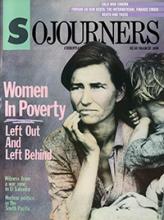By seasons, feasts, and scriptures, the churches seek to lead us through our history to nurture our consciousness on the bread of remembering. In this season we hearken to the biblical themes of exodus, covenant, and the new covenant in Christ as the food that will energize and inform our contemporary struggle for liberation and justice.
An astonishing aspect of the miracle that was the Exodus is the recorded "600,000 men on foot, not counting their dependents" (Exodus 12:37). A whole people uprooted themselves and moved into the unknown. This was displacement on a massive scale. Their readiness to move from the security of slavery, from the only reality they had known for four-and-a half generations, was more awesome than the willingness of Pharaoh to let them leave.
What organizer today would not grasp at the key to a process that would move enslaved people in the Egypts of today? The text of Exodus provides a few elements essential to this transformation of minds and hearts:
• They cried out, and their appeal for rescue from their slavery rose up to God (Exodus 2:23). Liberation begins in the recognition of a state of enslavement and in the faithful prayer for release.
• "But who am I," Moses said to God, "that I should go to Pharaoh..." (Exodus 3:11). Crane our necks as we might to seek the other, the leader, a power outside ourselves, the answer is always that there is none but us. Moreover, there never has been.
Read the Full Article

